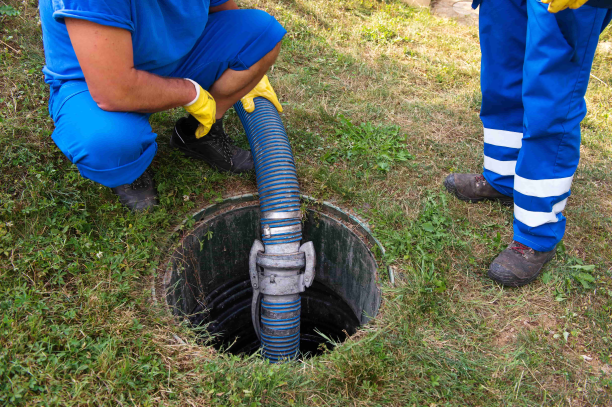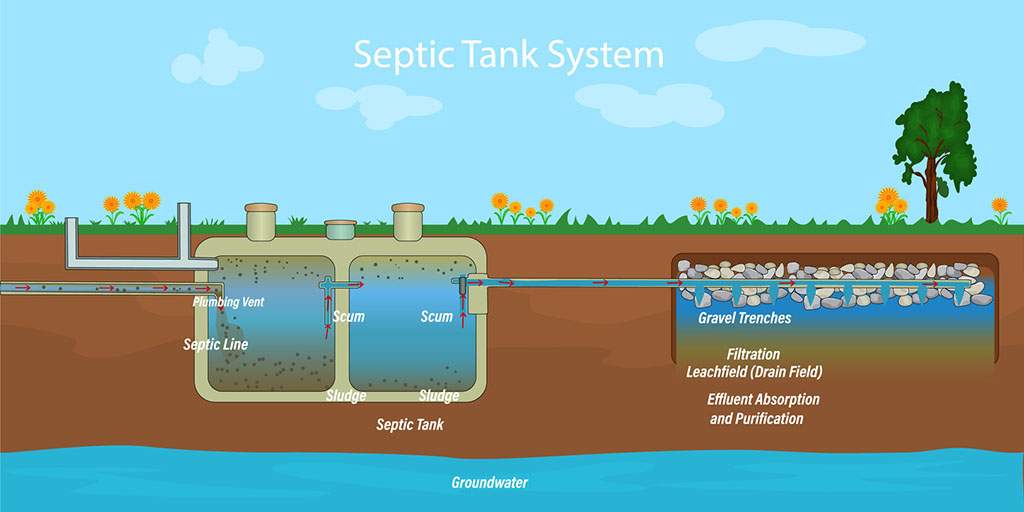Septic Tank Over-Pumping: Can You Pump It Too Much? Exploring the Dos and Don’ts
Are you facing a stinky situation with your septic tank? Worried about the do’s and don’ts of over-pumping? Well, hold on tight as we dive deep into the world of septic tanks to uncover the truth behind how much is too much. In this blog post, we will explore everything you need to know about septic tank over-pumping, from understanding the consequences to learning expert tips for maintaining a healthy system. So grab a cup of coffee and get ready to become a septic tank superhero!
Table of Contents
Introduction to Septic Tank Over-Pumping

Septic tank over-pumping, also known as excessive septic tank pumping, is a common concern among homeowners who have septic systems. Many people are not aware of the proper frequency for pumping their septic tank and tend to either pump it too often or not enough. Both scenarios can have significant consequences, which is why it is crucial to understand the dos and don’ts of septic tank pumping.
What is Septic Tank Over-Pumping?
A septic tank’s primary function is to collect and treat household wastewater before it is released into the drain field. As solids settle at the bottom of the tank, bacteria break them down, while liquid waste flows out into the soil absorption area.
Over time, solid waste accumulates in the septic tank, which needs to be pumped out periodically. However, if a homeowner pumps their septic system too frequently, they run the risk of removing essential bacteria from their system that help with breaking down solid waste. This process leads to an imbalanced ecosystem in the septic tank and can result in costly repairs.
On the other hand, not pumping your septic system enough can result in solids overflowing into your drain field and clogging up your pipes. This backup can cause sewage backups in your home and extensive damage to your yard’s landscaping.
Factors Affecting Pumping Frequency
Several factors influence how often you should pump your septic system. The most critical factor includes:
- Household Size and Water Usage: The more people living in a home, the more wastewater produced. A larger household may need to pump its septic tank more frequently compared to a smaller household.
- Tank Size: The size of your septic system also plays a role in how often it should be pumped. Smaller tanks have less holding capacity and require more frequent pumping compared to larger tanks.
- Solid Waste Production Habits: What goes into your septic tank can affect how often it needs to be pumped. If you frequently use a garbage disposal, pump out water softeners, or flush non-biodegradable items down the toilet, you’ll need to pump your tank more frequently.
- Soil Conditions: The type of soil on your property can also affect how often you need to pump your septic tank. Soil with poor drainage requires frequent pumping as it slows down the process of wastewater being absorbed into the ground.
- Age of Septic System: Older septic systems are likely to need more frequent pumping. As a system ages, it becomes less efficient at breaking down solid waste, resulting in more frequent cleaning requirements.
What is Septic Tank Over-Pumping?
Septic tank over-pumping refers to the unnecessary or excessive pumping of a septic tank beyond its recommended frequency. A septic tank that has been pumped too frequently may lead to a number of issues, including potential damage to the system itself.

Why Do People Over-Pump Their Septic Tanks?
There are several reasons why people might over-pump their septic tanks:
- Lack of understanding: One of the main reasons for over-pumping is simply not knowing how often a septic tank should be pumped and when it actually needs pumping.
- Fear of clogging: Many homeowners fear their septic system will fail if they don’t pump it often enough, leading them to err on the side of caution and pump more frequently.
- Pressure from companies: In some cases, companies that offer pumping services may advertise more frequent pumping as part of their maintenance packages in order to make more profit.
- High water usage: If a household has high water usage due to large family size or excessive water use habits, they may believe that they need to pump their septic tank more often.
Why is Septic Tank Over-Pumping a Problem?
Septic tank over-pumping can cause several problems for homeowners. These include:
- Damage to the system: Septic tanks rely on a balanced ecosystem of beneficial bacteria to break down waste. Over-pumping can disrupt this balance, causing damage to the delicate microbial balance in the tank.
- Excessive energy and water usage: Pumping requires energy and water, which can drive up utility bills for homeowners unnecessarily.
- Higher maintenance costs: Over-pumping can increase wear and tear on your septic system, resulting in higher maintenance costs over time.
- Environmental concerns: The unnecessary disposal of large amounts of wastewater can strain local sewage treatment facilities and potentially harm the environment.
How Often Should You Pump Your Septic Tank?
The frequency with which you should pump your septic tank depends on several factors, including the size of your household and how much water you use. On average, it is recommended that you have your septic tank pumped every 3-5 years by a professional.
To determine the appropriate pumping schedule for your system, consult with a licensed professional who specializes in septic systems. They will be able to assess your specific needs and provide guidance on the best pumping schedule for your household.
In general, it is important to follow the recommended pumping frequency to maintain the health and efficiency of your septic system, while also avoiding the problems associated with over-pumping.
The Importance of Regular Septic Tank Pumping
Septic tank pumping is a crucial maintenance task that must be done regularly to keep your septic system functioning properly. It involves removing the accumulated sludge and scum from the tank, which are by-products of the wastewater treatment process.
Regular septic tank pumping is essential for several reasons. First and foremost, it helps maintain the proper balance of bacteria in the septic tank. These bacteria are responsible for breaking down solid waste and keeping odors at bay. When there is an excessive build-up of sludge, it can overwhelm the bacterial population, leading to a decrease in their efficiency. This can result in foul odors, clogs, and even system failure.
Moreover, regular septic tank pumping prevents overflow issues and prolongs the lifespan of your system. As wastewater enters the septic tank, it is separated into three layers – scum (oils and grease), effluent (water), and sludge (solid waste). With time, these layers accumulate and reduce the available space for effluent storage. If left unchecked, this can lead to sewage backups or even flooding on your property.
Furthermore, regular pumping also helps identify potential problems early on before they escalate into costly repairs or replacements. During a routine pump-out, a professional technician can inspect your septic system for any signs of damage such as cracks or leaks. They may also conduct tests to check if there are any underlying issues with the drainage field.
The frequency of septic tank pumping varies depending on factors such as household size, usage, and tank capacity. As a general rule of thumb, it is recommended to have your septic tank pumped every 3-5 years. However, if you have a large household or use a garbage disposal, you may need to pump more often.
Signs That Your Septic Tank Needs Pumping
If you have a septic tank system, it is important to ensure that it is regularly maintained in order to prevent any issues or malfunctions. One crucial aspect of septic tank maintenance is pumping out the tank when necessary. But how do you know when your septic tank needs to be pumped?
In this section, we will discuss some of the key signs that indicate your septic tank may need pumping.
- Slow Draining and Backups: One of the most obvious signs that your septic tank needs pumping is when you start experiencing slow draining in your sinks, showers or toilets. This happens because the solid waste and sludge at the bottom of the tank have built up over time and are now inhibiting proper drainage.
Additionally, if you notice sewage backups into your drains or toilets, this could also be a sign of an overfilled septic tank. It’s important to address these issues immediately as they can lead to costly repairs if left untreated.
- Unpleasant Odors: Another tell-tale sign that your septic tank needs pumping is unpleasant odors coming from both inside and outside your home. If there is a strong smell of sewage near your drain field or in your yard, it could be an indication that the level of solids in your septic tank has become too high, causing gas buildup and therefore releasing pungent smells.
Similarly, if there are foul odors coming from inside your home even after cleaning, it could be due to gases escaping through dry drain traps because there is an excess of solids in the septic tank.
- Standing Water: Most septic systems are designed to allow for proper drainage of water, meaning that you shouldn’t see standing water around the area where the drain field is located. Puddles of water above your septic tank or near the drain field could indicate an overfilled or damaged tank that needs pumping.
If this standing water has a bad smell, it’s essential to contact a professional as soon as possible since it could also be an early sign of contamination.
- Abundant Plant Growth: If you notice lush patches of grass or other plants growing close to your septic tank system, this could be another sign of excessive waste discharge from an overfilled tank. The added moisture and nutrients naturally found in wastewater can actually cause plant growth to become thicker and greener than usual around the affected areas.
While it might be nice to have some greenery on your lawn, having too much plant growth is not ideal since their roots can infiltrate and clog outlets and pipes leading into the tank.
- Length of Time Since Last Pumping: The frequency at which you should pump out your septic tank depends on your household size and usage. Ideally, most septic tanks should be pumped every three to five years. However, if you live alone or have a smaller household size, you may only need to pump your tank every seven years or so.
On the flip side, if your household is larger or has more than two bathrooms, it’s likely that your septic tank will require more frequent pumping—every two years or less. It’s always best to check with a professional to determine how often you should pump out the tank.
Consequences of Not Pumping Enough
When it comes to septic tank maintenance, the phrase “out of sight, out of mind” is not a good mindset to have. Neglecting to properly maintain your septic tank by not pumping it enough can have serious consequences on both your health and the environment.
One of the main consequences of not pumping enough is sewage backup. As solid waste and sludge accumulate in your septic tank over time, they need to be pumped out regularly to avoid reaching capacity. If left unchecked, this buildup can lead to sewage backing up into your home or yard. This can result in foul odors, unsanitary conditions, and a potentially costly clean-up process.
Another consequence of not pumping enough is the potential for clogs and blockages in your plumbing system. When a septic tank is not pumped regularly, solid waste can make its way into drain lines and cause blockages. This means that toilets may not flush properly, sinks may drain slowly, or even worse – raw sewage could back up into your home.
Not pumping enough also puts strain on your septic system. A full septic tank means there is less space for new wastewater to enter and be treated properly. This excess wastewater then gets pushed out into the drain field before it has been fully treated by bacteria in the tank. Overloading the drain field with untreated wastewater can eventually lead to its failure and potentially require expensive repairs or replacement.
Additionally, neglecting regular pump-outs can shorten the lifespan of your entire septic system. If the tank is not pumped frequently enough, the solids and scum layers can build up to the point where they clog or damage important components of the system. This could lead to costly repairs or even a full replacement of your septic system.
From an environmental standpoint, not pumping enough can also have serious consequences. The wastewater from your septic tank contains harmful bacteria, viruses, and nutrients that can contaminate groundwater and nearby bodies of water if not properly treated. This can harm aquatic life and make the water unsafe for human consumption.
Effects of Over-Pumping on Your Septic System
Septic system over-pumping refers to when a septic tank is pumped more frequently than necessary, usually due to fear of potential problems or as a preventive maintenance measure. While it may seem like a logical step to ensure the proper functioning of your septic system, over-pumping can actually have negative effects on your system’s overall health. In this section, we will explore the various effects of over-pumping on your septic system.
- Disrupts the Balance of Microbes: The primary function of a septic system is the breakdown and decomposition of solid waste by naturally occurring microbes in the tank. When a septic tank is over-pumped, it disrupts the balance of these microbes, resulting in insufficient breakdown and decomposition of waste. This can lead to accumulation and build-up of sludge at the bottom of the tank, causing potential clogging and back-ups in your household plumbing.
- Increases Water Usage: Over-pumping also means increased water usage as more water flows into and out of your septic tank. This influx disturbs the natural settling process inside the tank which allows solids to settle at the bottom while scum floats on top. The constant disruption can cause solids to be pushed into and block drain fields leading to costly repairs later on.
- Creates Extra Expenses: Septic pumping can be an expensive affair; hence frequent over-pumping only adds up unnecessary costs for homeowners. Usually recommended every 3-5 years depending upon family size and usage, a hefty price tag attached to it if done unnecessarily doesn’t fit into a household budget. You should only pump your septic tank when it’s absolutely necessary to maintain the recommended balance of solid waste, water, and microbes.
- Impact on the Environment: When a septic system is over-pumped, excess wastewater is discharged which can overwhelm the drain field. This leads to backups and overflow of raw sewage onto the surface of the drain field, potentially contaminating nearby groundwater reserves and surfaces. Besides that, it also adversely affects other indigenous organisms present in the soil resulting in an unbalanced ecosystem.
- Causes Damage to System Components: Over-pumping can damage various components of your septic system such as baffles, inlet, and outlet pipes, or even cause cracks in the tank itself. These damages are expensive to repair often requiring heavy equipment and may lead to partial replacement of your septic system components.
To avoid these negative effects, make sure you only pump your septic system at recommended intervals and consult with a professional if you suspect any problems with your system. Prevention is always better than cure when it comes to maintaining your septic system.
How Often Should You Pump Your Septic Tank?
Proper maintenance of your septic tank is crucial for preventing costly and inconvenient issues in the future. One important aspect of this maintenance is regularly pumping your septic tank to remove accumulated solids and sludge. But how often should you pump it? Is there such a thing as pumping it too much? In this section, we’ll explore the dos and don’ts of septic tank pumping and provide recommendations on how often you should do it.
Dos:
- Know Your Household’s Water Usage: The frequency at which you should pump your septic tank depends on the size of your tank, the number of people living in your household, and their water usage habits. A general rule of thumb is to have your septic tank pumped every 3-5 years for a family of four with a standard-sized 1000-gallon tank.
However, if you have a larger household or use more water due to frequent laundry or outdoor activities like gardening, then you may need to pump more frequently. On the other hand, if there are only one or two people living in your home who use less water, then pumping every 5-7 years may suffice.
- Keep an Eye Out for Warning Signs: Aside from knowing your household’s water usage habits, there are certain warning signs that indicate it’s time for a septic tank pumping regardless of when it was last pumped. These include slow drains, gurgling sounds coming from pipes, sewage backups into toilets or sinks, foul odors around your septic tank, and unusually green patches of grass near the drain field.
- Have Your Septic Tank Inspected Regularly: Pumping your septic tank may not effectively remove all solids and sludge if there are other underlying issues with your system. A professional septic tank inspector can detect such problems during regular inspections, which typically occur every 3-5 years.
Don’ts:
- Forget to Keep Records: It’s a common practice to forget when you last pumped or serviced your septic tank. To remedy this, keep records on hand and take note of the date of pumping or servicing as well as any significant findings from inspections. This will help you create a timeline for future pumping and quickly identify any changes from previous inspections that may need immediate attention.
- Wait Too Long to Pump Your Tank: Waiting too long between pumpings can lead to issues like clogs, backups, blockages in your drainage pipes caused by solids flowing into them, and an overworked drain field that won’t be able to handle increasing wastewater volumes over time. The latter is especially concerning as it can cause leaks and contamination of nearby soil areas.
Tips for Avoiding Septic Tank Over-Pumping

Septic tank over-pumping is a common concern for many homeowners with septic systems. Over-pumping can lead to unnecessary expenses and potential damage to your system, but luckily there are steps you can take to avoid it. In this section, we will discuss some helpful tips for avoiding septic tank over-pumping.
- Regular Maintenance: The most important step you can take to prevent septic tank over-pumping is by regularly maintaining your system. This includes getting your tank pumped on a recommended schedule based on its size and usage, typically every 3-5 years. Regular maintenance will ensure that your system is functioning properly and prevent any buildup of solids that could lead to over-pumping.
- Watch Your Water Usage: Another factor that contributes to septic tank over-pumping is excessive water usage. The more water you use in your household, the more strain it puts on your septic system. Be mindful of how much water you are using, and try to conserve it whenever possible. Simple measures like fixing leaky faucets or using low-flow fixtures can significantly reduce water usage and alleviate strain on your septic tank.
- Practice Proper Waste Disposal: Septic systems are designed to handle only human waste and biodegradable materials like toilet paper. Flushing items such as diapers, feminine hygiene products, or grease down the drain can quickly clog up your system and cause over-pumping issues.
- Avoid Chemicals: Harsh chemicals like bleach, drain cleaners, and antibacterial soaps can kill the beneficial bacteria in your septic tank that is responsible for breaking down solids. Without these bacteria, waste will accumulate faster and lead to over-pumping. Avoid using these chemicals whenever possible, and opt for natural cleaning alternatives instead.
- Be Mindful of What Goes Down Your Garbage Disposal: Garbage disposals can be a useful tool in the kitchen, but they also contribute to septic tank problems. The solid particles from food waste can quickly clog up your system and cause over-pumping. Avoid putting items like coffee grounds, eggshells, or fibrous foods down your disposal.
Conclusion: Finding the Right Balance for Proper Septic System
Having a septic tank is essential for proper waste management in any household or property that is not connected to a municipal sewage system. However, maintaining a septic system requires some effort and understanding of how it works.
One common question that arises when it comes to septic systems is whether or not it is possible to over-pump the tank. The answer is yes, you can pump your septic tank too much, and doing so can cause more harm than good.
Over-pumping refers to the act of emptying your septic tank more frequently than necessary. This could be due to various reasons such as excessive usage, fear of system failure, or following outdated pumping recommendations.
While regular pumping of your septic tank is important, overdoing it can disrupt the balance of bacteria and microorganisms inside the tank. These organisms are responsible for breaking down solid wastes and keeping the system functioning properly. When there is an excessive amount of sludge removed from the tank during over-pumping, it upsets this delicate balance and can lead to issues with the overall functioning of your septic system.
On top of that, frequent over-pumping also means spending more money on unnecessary pumping services. Septic tanks are designed to operate at certain levels, and removing too much waste at once may result in damaged pipes or other parts due to increased pressure from lack of weight on top.







